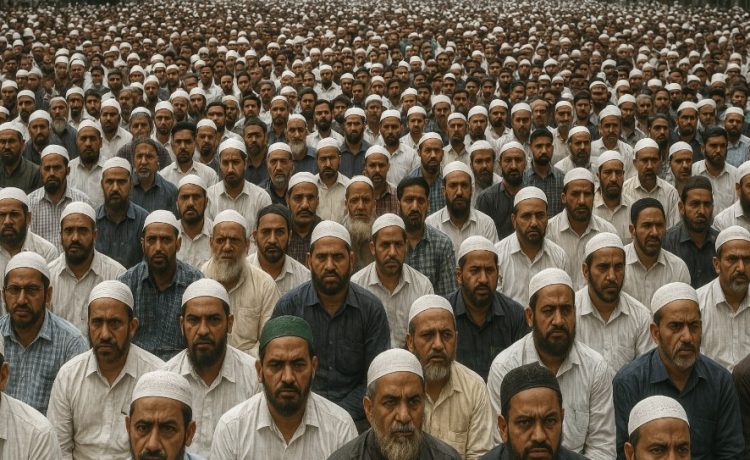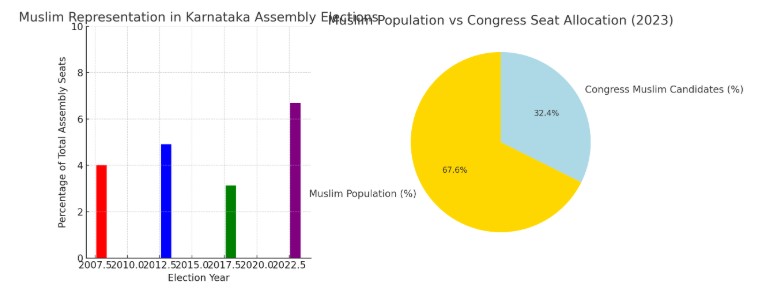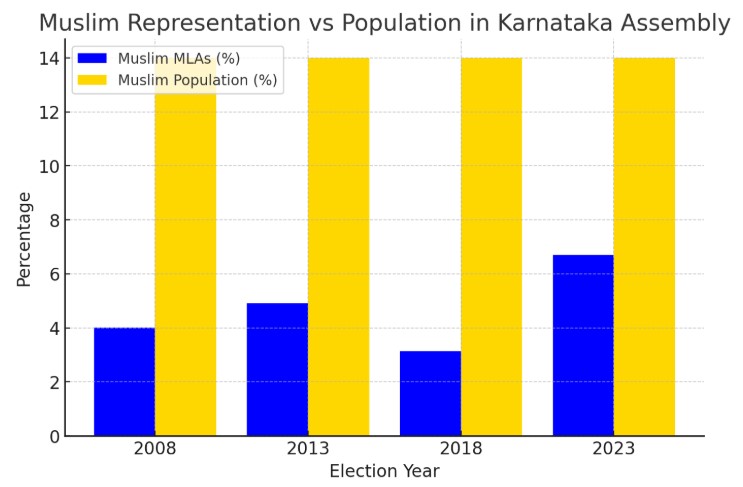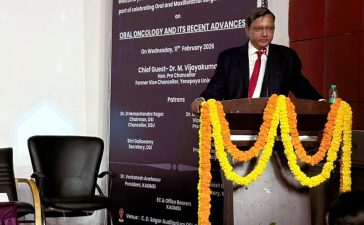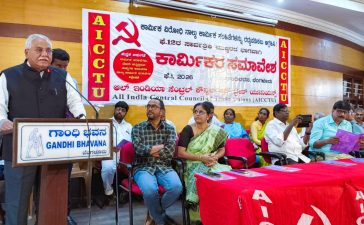“The Silence of Representation: Karnataka’s Muslim Community and Political Betrayal” – Hares Siddiqui
A Growing Sense of Neglect
The Muslim community in Karnataka, comprising approximately 14% of the state’s population, is increasingly grappling with political underrepresentation. Despite a historical allegiance to the Congress party, the community’s expectations for equitable political participation have been shamelessly ignored, fueling widespread disillusionment and anger.
Unfulfilled Promises in Electoral Representation
In the 2023 Karnataka Assembly elections, Muslim leaders and activists pushed for 21 out of the 224 assembly seats to reflect their demographic weight. However, the Congress party insultingly allocated only 15, leaving many feeling betrayed. This frustration deepened during the 2024 Parliamentary elections when the community sought three seats but was granted just one, a glaring display of Congress’s indifference toward its most loyal voter base.
Congress had previously assured increased representation for Muslims through key nominations, including seats in the Legislative Council (MLC) and Rajya Sabha. However, these commitments have been blatantly disregarded, further exposing the party’s pattern of making hollow promises to secure votes while failing to deliver when it matters most.
A Last-Minute Gesture and Lingering Discontent
During the recent MLC elections, the Congress party had an opportunity to appoint at least seven members. Yet, in a stunning act of neglect, no Muslim nominee was considered until the last moment when Bilqees Banu was appointed. While this appointment was welcomed, it was nothing more than a tokenistic afterthought rather than a genuine attempt to address the broader issue of underrepresentation.
Of particular concern is the Kalyan Karnataka region, home to a significant Muslim population but deliberately left without an MLC representative. The absence of political representation in such areas has heightened frustration, particularly among younger voters who are increasingly exploring alternative political options such as the All India Majlis-e-Ittehad-ul-Muslimeen (AIMIM) and the Social Democratic Party of India (SDPI). This shift signals a potential realignment in Karnataka’s political landscape, as disenfranchised voters seek new avenues to assert their rights.

The Risk of Political Alienation
Congress’s betrayal of its Muslim electorate is now undeniable. The party’s repeated failure to uphold its commitments raises serious concerns about the complicity of its Muslim leaders, many of whom appear more interested in protecting their political careers than advocating for the rightful representation of their community. If this trend continues, Congress will inevitably alienate a crucial voter base, driving them toward parties that actually prioritize their rights and interests.
A Call for Meaningful Action, Not Hollow Promises
The Congress party must immediately address its shameful neglect of Karnataka’s Muslim community and take concrete steps to rectify the damage. At the very least, ensuring one MLC position in the upcoming nominations should be a baseline expectation, not a begrudging favor. Fair representation is not an extraordinary demand—it is a fundamental democratic principle, and the community will no longer tolerate being treated as a dispensable vote bank.
The time for empty rhetoric has passed. If Congress wishes to maintain any credibility with its Muslim electorate, it must take decisive action—engaging with community leaders, fulfilling its promises, and fostering inclusive political participation. Until then, the cycle of betrayal and alienation will persist, permanently altering Karnataka’s political landscape and forcing the community to seek alternatives that will truly fight for their rights.
Solutions Ahead
To address this crisis of representation, several measures must be taken. First, the Congress party must implement a transparent and structured mechanism to ensure fair political representation for the Muslim community, moving beyond empty assurances. Second, the party must prioritize meaningful engagement with Muslim leaders and grassroots organizations to understand the pressing concerns of the electorate. Third, internal reforms must be introduced to hold party leaders accountable for fulfilling promises made during election campaigns. Lastly, Muslim leaders within Congress must shed their passivity and actively advocate for their community’s rights instead of toeing the party line. Without these essential steps, the party risks a complete erosion of trust, which may permanently shift the political landscape in Karnataka.
Key Quotes:
-
“The Congress party has long benefited from Muslim votes, yet it continues to marginalize the very community that stands by it during elections.”
-
“Political representation is not a favor; it is a fundamental democratic right that Congress has repeatedly denied Karnataka’s Muslim community.”
-
“The absence of Muslim leaders in legislative bodies is not an oversight—it is a deliberate betrayal.”
-
“If Congress refuses to listen to its most loyal voters, the community will find alternatives that truly represent them.”
-
“A single token appointment cannot erase years of neglect and broken promises.”
Q & A:
Q: Why is the Muslim community in Karnataka feeling betrayed by Congress?
A: Despite being a significant voter base, Muslims in Karnataka have faced repeated political neglect, with Congress failing to provide adequate representation in Assembly, Parliamentary, and MLC seats.
Q: What was the community’s demand for representation?
A: The community sought 21 Assembly seats in 2023 and three Parliamentary seats in 2024, but Congress only granted 15 and one, respectively, exposing its disregard for equitable representation.
Q: How has this impacted the community’s political outlook?
A: Many disillusioned voters are now exploring alternatives like AIMIM and SDPI, signaling a possible political shift in Karnataka.
Q: What steps can Congress take to regain trust?
A: It must fulfill its promises, ensure transparent nomination processes, engage with community leaders, and guarantee proportional representation in governance.
Summary:
The Muslim community in Karnataka, historically a strong support base for Congress, is increasingly disillusioned due to persistent underrepresentation in political appointments. Despite making up 14% of the state’s population, the community has been sidelined in Assembly, Parliamentary, and MLC nominations. Frustration is growing, especially among the youth, who are considering alternative political parties that prioritize their rights. If Congress does not take immediate corrective measures, it risks permanently losing a key voter base.
Context & Background:
For decades, Karnataka’s Muslim community has largely supported Congress, expecting fair political representation in return. However, recent electoral cycles have seen a significant reduction in Muslim nominees, despite assurances from party leadership. The frustration is exacerbated by the lack of appointments in the MLC elections, with only one last-minute nomination. With growing political discontent, Muslim voters are now seeking alternatives, challenging Congress’s traditional stronghold.
#PoliticalBetrayal #MuslimRepresentation #CongressFailure #VoteForChange #KarnatakaPolitics #EqualRepresentation #DemocracyMatters #CongressNeglect
Timeline of Events
2023 Karnataka Assembly Elections:
-
The Muslim community demands 21 out of 224 seats to reflect their demographic weight.
-
Congress allocates only 15 seats, disappointing community leaders and activists.
2024 Parliamentary Elections:
-
Muslim leaders request three seats, but Congress grants only one, furthering frustration.
-
Congress assures increased representation in upcoming MLC and Rajya Sabha nominations.
2024 MLC Elections:
-
Congress has the opportunity to appoint at least seven MLCs but initially fails to nominate a single Muslim candidate.
-
After intense backlash, Bilqees Banu is appointed at the last moment—seen as a token gesture rather than genuine inclusion.
Growing Political Discontent:
-
Disillusionment spreads within the community, especially in regions like Kalyan Karnataka, where there is no Muslim MLC representation.
-
The youth begin shifting toward alternative political parties like AIMIM and SDPI.
March 2025:
-
Muslim community leaders and political analysts call out Congress’s failure to honor commitments.
-
Demands for at least one MLC position in the upcoming nominations gain momentum.
Political Reactions
Congress Party Leadership:
-
Initially silent on the issue, Congress leaders deflect criticism by pointing to past Muslim representation within the party.
-
After backlash, Congress scrambles to appoint Bilqees Banu as an MLC, but the move is widely criticized as too little, too late.
-
Some Congress Muslim leaders attempt damage control, urging patience, but their silence on broader representation issues sparks further criticism.
BJP Leadership:
-
BJP leaders seize the opportunity to highlight Congress’s failure to deliver on promises to its loyal voter base.
-
BJP strategically downplays its own lack of Muslim representation but portrays Congress as exploitative and insincere in its approach to minority communities.
-
The party subtly encourages Muslim voters to reconsider their loyalty, positioning BJP as an alternative while continuing its outreach to OBC and Dalit communities.
JDS Leadership:
-
JDS criticizes Congress’s neglect of Muslims but does little to actively court the community.
-
The party remains focused on consolidating its traditional Vokkaliga vote base while occasionally addressing Muslim concerns to weaken Congress’s grip on minority voters.
-
Some JDS leaders suggest that their party has been more inclusive than Congress, yet their Muslim representation remains minimal.
Legal Aspects
-
Constitutional Rights & Political Representation:
-
The right to equal representation is not explicitly enshrined in the Indian Constitution, but principles of democracy and social justice (Articles 14, 15, and 16) support fair political inclusion.
-
Political parties are not legally bound to allocate seats based on population demographics, but their commitments are subject to public and electoral scrutiny.
-
-
Election Commission Regulations:
-
There are no legal mandates requiring Congress (or any party) to nominate Muslim candidates, but parties often pledge representation to secure votes.
-
The lack of internal party democracy in decision-making regarding nominations remains a major concern in Indian politics.
-
-
Affirmative Action & Reservation Debate:
-
While SC/ST communities benefit from constitutionally mandated reservations, religious minorities, including Muslims, do not enjoy the same guaranteed political representation.
-
Past recommendations from the Sachar Committee and Ranganath Mishra Commission highlighted the need for greater Muslim representation in governance, but no legal framework was adopted to ensure this.
-
-
Legal Challenges & Advocacy:
-
Activists may approach the courts to demand greater political representation, but judicial intervention in party nomination processes is limited.
-
Civil rights groups have previously petitioned for stronger minority representation in elected bodies, but progress remains slow.
-
Future Implications
-
Political Realignment:
-
Continued neglect by Congress may push Karnataka’s Muslim voters toward alternative parties like AIMIM, SDPI, or regional alliances that prioritize their concerns.
-
The BJP may attempt to exploit Congress’s failure by positioning itself as a viable alternative, despite its own limited engagement with Muslim representation.
-
-
Rise of Identity-Based Politics:
-
The growing frustration among Muslim youth could accelerate the rise of identity-based politics, further fragmenting Karnataka’s political landscape.
-
A shift towards independent Muslim candidates or coalition politics could challenge Congress’s historical dominance over the community’s vote bank.
-
-
Impact on Electoral Outcomes:
-
Congress risks losing a crucial segment of its voter base in the upcoming state and national elections, which could significantly alter seat calculations.
-
A weakened Congress in Karnataka may strengthen BJP’s hold over the state, leading to policy shifts that further marginalize the Muslim community.
-
-
Social & Economic Consequences:
-
Lack of political representation often translates into reduced focus on community-centric policies, affecting employment, education, and social welfare programs for Muslims.
-
If the political alienation continues, it could exacerbate socio-economic disparities, leading to increased disenchantment and radicalization risks among marginalized groups.
-
![]()

